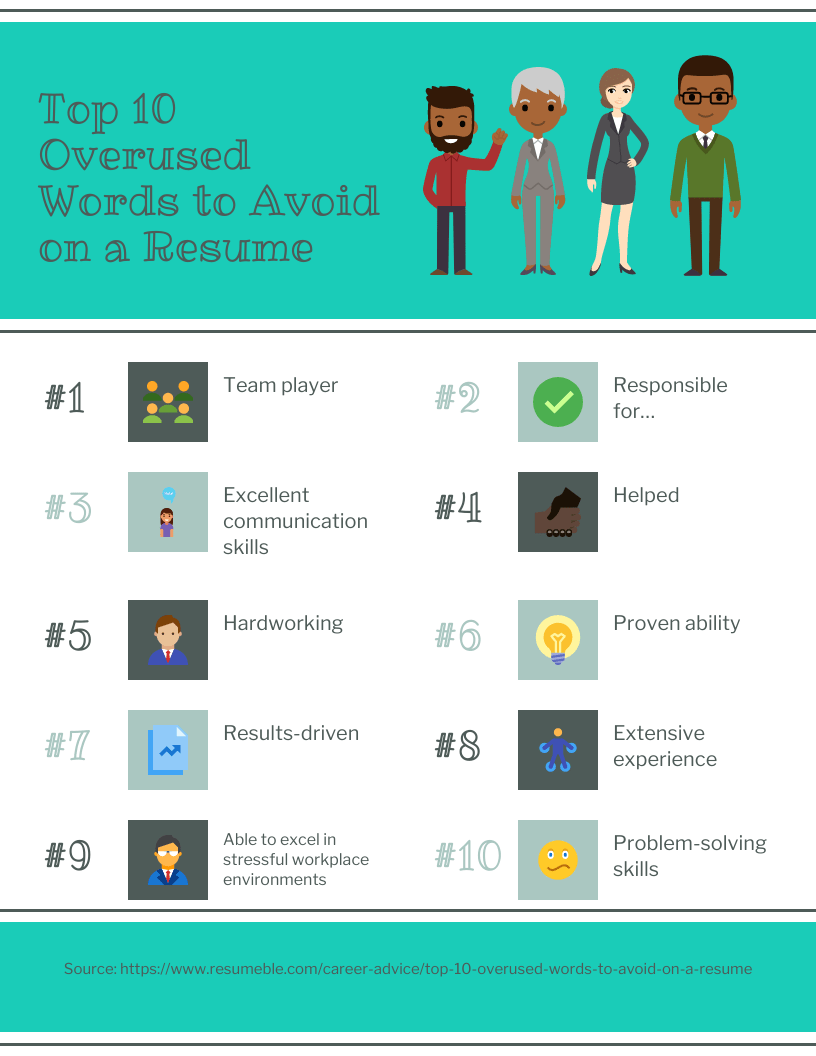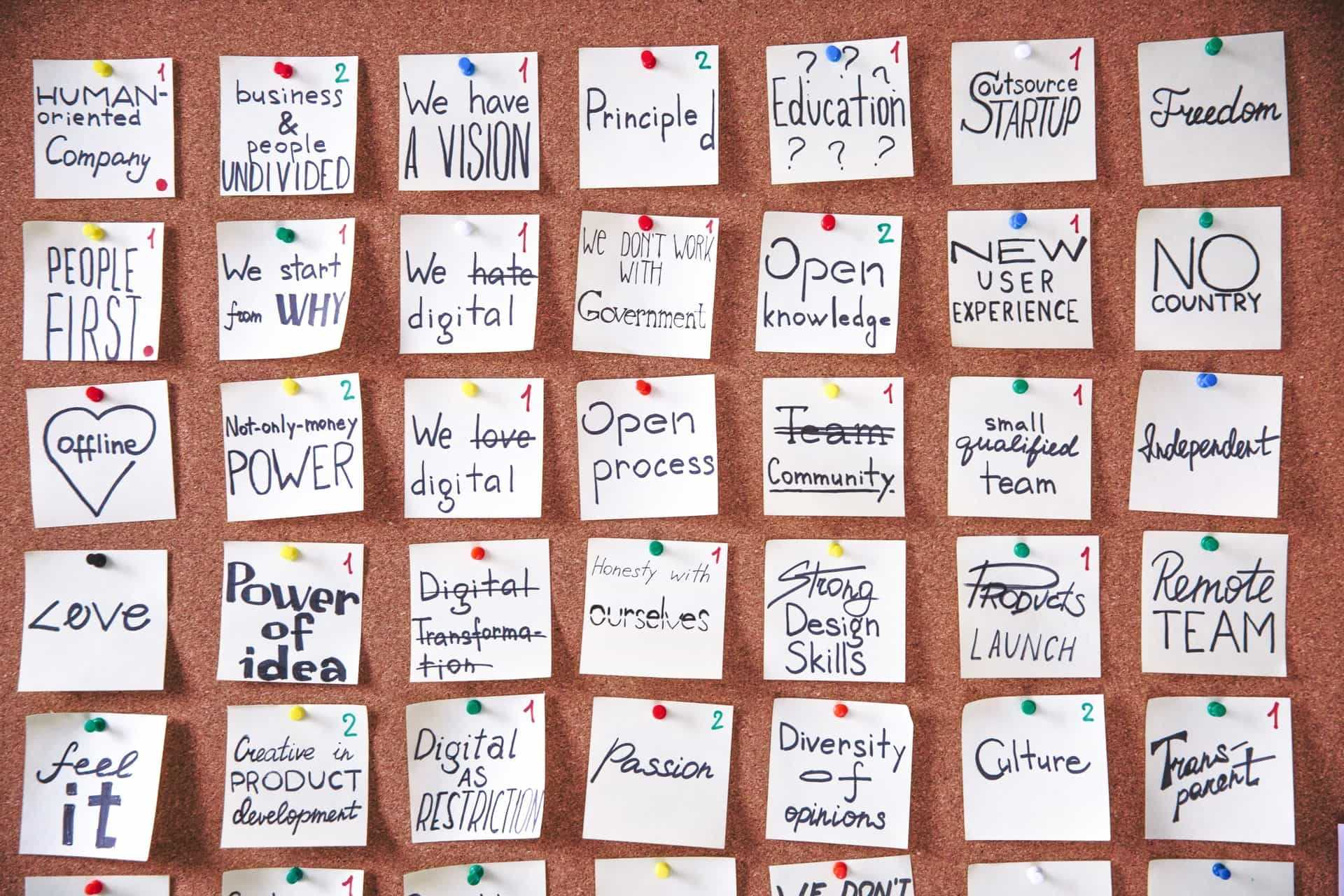With every passing year, it seems as if employers are taking shorter and shorter time to review the contents of an applicant's resume. It’s easy to imagine that one of the reasons is that they’re wary of reading the same words and phrases used by one applicant after another. How long do you think before you grow tired of reading words over and over again, like “team player,” “responsible for,” or “proven ability?” Needless to say, if you want to stand out in the crowded job market, you have to work to make your resume sound fresh and exciting. It all starts by avoiding overused resume words.
The Top 10 Overused Words and Phrases to Avoid on Your Resume
It helps to know which words to avoid and which ones to include, and, basically, secure your chances of meeting a recruiter face to face.

1. Team Player
Almost everyone with a bit of work history can claim to be a team player. It’s a soft skill that is already expected of any applicant, but hard to prove on paper. Besides, a recruiter or hiring manager can know more about your ability to work well with others during your interview. Replace it with active verbs like “collaborated,” “cooperated,” or “co-developed,” and apply them to bullet points that highlight your achievements.
Rather than simply stating that you're a team player, show how you've worked within teams by highlighting your role, using collaborative action verbs, and measurable achievements:
- Launched a product update in collaboration with the IT team, increasing retention by 15%
- Co-developed marketing strategies with design and sales leads, resulting in a 30% boost in campaign engagement
That said, it's also perfectly okay not to be a natural team player - and to instead thrive as an independent contributor.
In today's workplace, many roles require intense focus, deep work, and the ability to work autonomously without constant group input. The rise of over-collaboration has often unintentionally overshadowed the strengths of introverts and highly independent professionals — people who may not speak up in every meeting, but who produce exceptional results because of their ability to concentrate, discipline, and self-direct.
Recruiters value applicants who deliver results without constant hand-holding. This is especially important with remote or hybrid work schedules. Don't be afraid to mention this in your resume. Done correctly, it will show your introversion as a strength instead of a weakness.
- Independently managed and completed a 6-month analytics project, delivering actionable insights that informed executive strategy
- Completed complex assignments with minimal supervision within the set deadline
Balance is key. While collaboration is valuable, don't downplay your solo performance skills - especially in a workforce that is slowly re-learning to appreciate the quiet power of independent excellence.
2. Responsible for
Overused resume phrasing like this one makes you sound dull and uninspired. Being “responsible for” a duty implies that your work was something that you did involuntarily, so to speak.
This is also passive voice, which speaks to you not being in control of your actions and responsibilities. Passive voice distances you from your own contributions. It sounds like things happened to you, rather than because of you.
Instead of saying "Responsible for team scheduling," use "Managed team schedules for 12 employees, improving shift efficiency by 20%." Strong action verbs convey ownership, energy, and confidence. Avoiding passive voice helps you sound more engaged and capable and shows that you didn't just follow instructions - you made things happen. Turn this boring phrase into something more decisive with better words like “led,” “managed,” “initiated,” or “launched.”
3. Excellent Communication Skills
This one plagues almost all resumes. Like being a “team player,” your communication skills will be put to the test during your interview, so there’s really no need to mention this overused phrase on your resume.
If the ability to speak accurately, clearly, and as intended is a requirement of the job, your resume will read better if you can describe your communication skills with a tad more specificity. Here are some examples of conveying the effectiveness of your spoken word.
• Empathic listener and persuasive speaker
• Exemplary presentation and negotiation skills
• Confident, articulate, and exceptional in written and verbal communication
Even better, support your resume with a well-structured cover letter in which you can communicate your ability to communicate excellently without stating it outright.
4. Helped
Just like “responsible for,” “helped” is one of those boring resume words that make recruiters cringe because it makes an employee sound reactive rather than proactive. Helping or assisting in something indicates that you simply contributed to success, but it doesn’t really say anything about the amount of effort you put in.
What to use instead? Robust verbs like “directed” or “spearheaded” are much more powerful alternative resume words that are not overused. In addition, instead of mentioning that you “helped” achieve a company’s overarching goal, focus on your actual contributions to the task and how your work was instrumental in achieving said goal. Here are some sample statements:
• Supervised the development of a marketing plan that yielded a 20% YOY increase in profits
• Contacted 500 leads in one week via emails and cold calls, yielding a 75% conversion rate and helping the company exceed June 2019 monthly sales targets by 64%
5. Hardworking
Hands down, it is one of the most overused resume words out there. Anyone can claim to be a hard worker on their resume, but your statements will be more convincing if you provide detailed descriptions of how an employer benefited from your extra efforts.
What to use instead: If you really are a hard worker, you can back up that claim with actual data. Here are a few ideas of what you can say:
• Logged an average of 3 hours of overtime work in August 2020 to speed up the completion of a massive public roadway project
• Volunteered to work additional hours at the end of every month to help meet the company’s monthly inventory goals
6. Proven Ability
While it sounds impressive, the phrase “proven ability” is too vague and doesn’t actually prove anything. Resumes are not placed for assumptions. They cannot actually provide proof, so it’s best to avoid terms like “proven.” How do you handle overused resume words like these? To make your accomplishments more believable, try substituting these clichés with quantifiable results that include hard numbers and percentages.
This is how you replace “proven ability” with more evidence-based statements:
- Swap vague claims with action-oriented results: Instead of “Proven ability to lead teams,” say “Led a cross-functional team of 10 that delivered a $2M project three weeks ahead of schedule.”
- Highlight specific tools or methods: “Proven ability in data analysis” becomes “Utilized Power BI and Excel to identify sales inefficiencies, leading to a 17% improvement in quarterly revenue.”
Employers don’t need to hear that your ability is “proven” - they want to see what you’ve done, how you did it, and what impact it had. That’s what makes your resume truly stand out. The CARR method is great for this, as well!
7. Results-Driven
As an employee, it’s practically expected that you deliver results. Again, you’ll produce a bigger impact by detailing the results you’ve achieved with numbers and metrics. Saying you're "results-driven" is like saying a chef is "food-focused." It's trite. To make an impact, go beyond the buzzword and demonstrate how you focus on outcomes that create value.
Replace generic claims with specific examples:
- Quantify the outcomes: Instead of "Results-driven marketing professional," say: "Launched a digital campaign that increased lead generation by 45% within 3 months."
- Link effort to business impact: "Streamlined onboarding process, reducing new hire training time by 30% and improving retention by 18% over two quarters."
Add measurable achievements and position yourself as someone who can deliver results consistently. Let the numbers do the talking in this case.
8. Extensive Experience
Aside from being one of the most overused resume words, “extensive experience” is also overly generic. Besides, you already have your experience section to show your work history. Avoid using this term, and you’ll have more space for more important topics in your application.
Instead of using this vague phrasing, be specific about what your experience actually includes. Focus on the results and context of your achievements.
For example, replace “extensive experience in advertising” with “10+ years leading multi-channel marketing campaigns that increased brand engagement by 40%.”
Provide a measurable impact and help your resume stand out to both recruiters (or hiring managers) and ATS. Use action verbs like led, developed, managed, or executed alongside specific details. By being more precise, you demonstrate value rather than just claiming it. That’s what resonates with employers and gets you hired.
9. Able to Excel in Stressful Workplace Environments
This phrase isn’t really that deflated, but you should use it with care. If your objective is to demonstrate your decision-making and adaptability, make sure to accompany it with market knowledge, industry-specific proficiency, and/or real, measurable achievements. It can also inadvertently hint at a toxic workplace. So be very careful when using it. You can use it to describe clear examples of performance under pressure. To add even more value - include measurable results.
Like this: “Led a product launch under a compressed timeline, achieved a 25% increase in quarterly revenue.”
Also, pair this quality with industry-specific knowledge or critical thinking skills to demonstrate competence, not just endurance. Remember, employers value resilience, true. But they value strategic thinking and results-driven action under pressure even more.
10. Problem-Solving Skills
An essential soft skill to have, but you have to be more specific - find an actual situation in your work history in which your problem-solving skills were put to good use.
Instead of listing it as a buzzword, show it in action:
- Identify the challenge: For example, “Resolved a 30% drop in customer satisfaction by analyzing service feedback and redesigning the support workflow.”
- Highlight your approach: “Implemented a new inventory tracking system that reduced stock errors by 50%.”
- Show the result: “Saved the company $120,000 annually by streamlining vendor negotiations during a supply chain disruption.”
Resumeble knows how to handle overused resume words
Work with Resumeble to elevate your resume to where it needs to be. With in-depth industry knowledge, we can help you avoid all the pitfalls of resume writing, such as overused resume words, grammatical errors, and more. Send us your resume today for a free evaluation.
